What Is the Best Age to Start Cat Socialization?
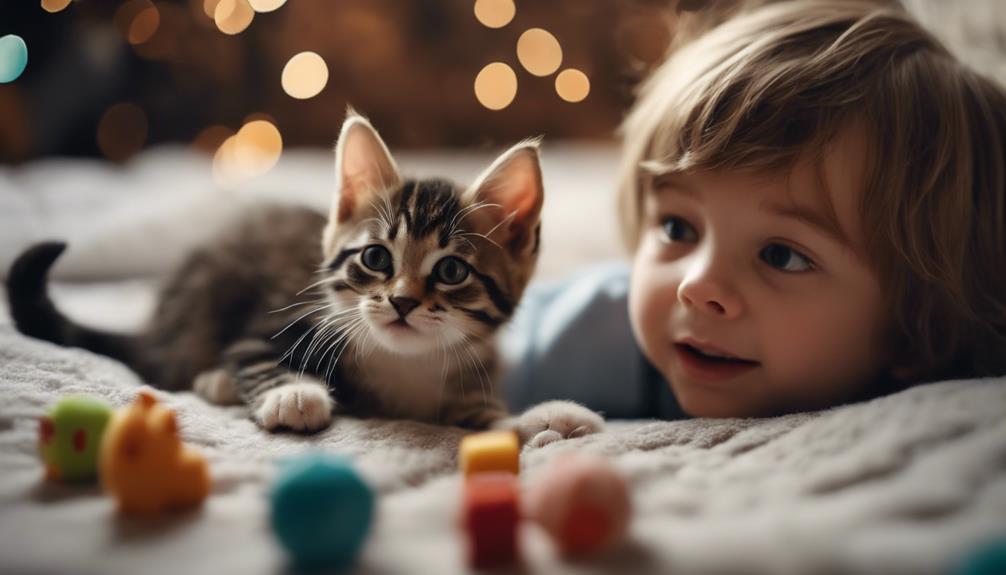
Socializing a cat is crucial for their well-being and happiness. The best age to start cat socialization is during the kitten's critical socialization period, which is between 2 and 7 weeks old. During this time, kittens are more receptive to new experiences and are more likely to form positive associations with people, other animals, and their environment.
Early socialization helps kittens grow into confident, well-adjusted cats that are comfortable with various situations and interactions. It is important to expose kittens to different people, sounds, sights, and experiences in a positive and controlled manner.
Proper socialization can prevent behavior issues such as fearfulness, aggression, and anxiety later in life. It is essential to follow guidelines for safe and effective socialization, including gradual exposure, positive reinforcement, and respect for the kitten's comfort level.
By starting socialization early and following best practices, cat owners can help their kittens develop into happy, sociable companions that enrich their lives.
Importance of Early Socialization
Early socialization plays a crucial role in shaping a cat's behavior and overall well-being. Socialization benefits encompass the positive influence it has on a cat's ability to adapt to various environments, interact with humans and other animals, and mitigate fear responses.
During different developmental stages, exposing kittens to diverse stimuli, such as different sounds, textures, people, and experiences, is essential for their social and emotional growth. Kittens are most receptive to socialization between 2 to 7 weeks of age, with the critical period being between 2 to 9 weeks. This period is when they're more adaptable and open to forming positive associations, which can significantly impact their future behavior and temperament.
Early socialization can prevent behavioral issues like aggression, fearfulness, and shyness, making it easier for cats to integrate into new households or environments. Therefore, initiating socialization efforts during the appropriate developmental stages is vital for fostering well-adjusted and sociable feline companions.
Key Factors to Consider
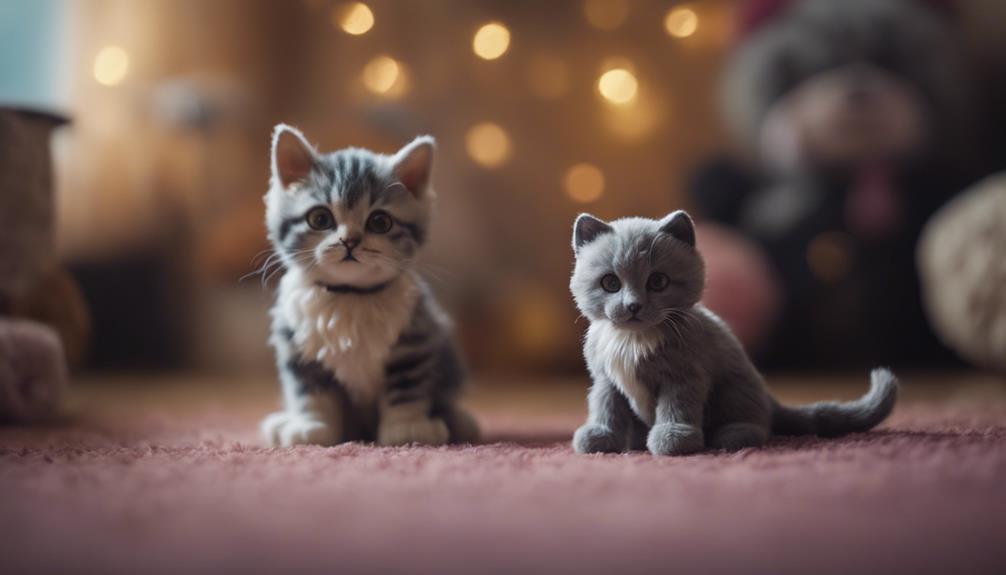
When considering the best age to start cat socialization, key factors play a crucial role in determining success.
These factors include the optimal socialization age, the importance of early socialization, and the various techniques that can be employed to socialize kittens effectively.
Understanding and implementing these factors can significantly impact a cat's socialization process and overall well-being.
Optimal Socialization Age
During the critical socialization period of a cat, several key factors should be considered to determine the optimal age for initiating this process. Socialization benefits and early bonding play a crucial role in shaping a cat's behavior and overall well-being. Here are some key factors to consider:
| Factor | Description | Importance |
|---|---|---|
| Kitten's Age | Younger kittens tend to be more adaptable | High |
| Previous Trauma | Cats with traumatic experiences may need more time | Medium |
| Social Environment | A calm and positive environment promotes socialization | High |
| Consistency | Regular interactions aid in building trust | High |
| Individual Cat Traits | Each cat has unique personalities and needs | Medium |
Importance of Early Socialization
In the process of socializing a cat, considering key factors like the kitten's age, previous trauma, social environment, consistency, and individual cat traits is essential for fostering positive behavioral development and overall well-being.
Early socialization benefits kittens by helping them become well-adjusted, confident, and friendly adult cats. Early interactions with humans, other animals, and various environments play a crucial role in shaping a kitten's social skills and responses to stimuli.
Kittens that are exposed to positive experiences during their early developmental stages are more likely to exhibit sociable behaviors and adapt well to new situations later in life. Therefore, prioritizing early socialization and providing a nurturing environment can significantly impact a cat's long-term social well-being and overall quality of life.
Socialization Techniques for Kittens
Considering key factors like the kitten's age, previous trauma, social environment, consistency, and individual cat traits is crucial when implementing socialization techniques for kittens to ensure positive behavioral development and overall well-being.
- Playful Interactions: Engage kittens in interactive play sessions with toys to build confidence and trust.
- Positive Reinforcement: Reward desired behaviors with treats or praise to encourage learning and bonding.
- Consistency: Maintain a regular schedule for socialization activities to establish a sense of security and predictability for the kitten.
Benefits of Timely Socialization
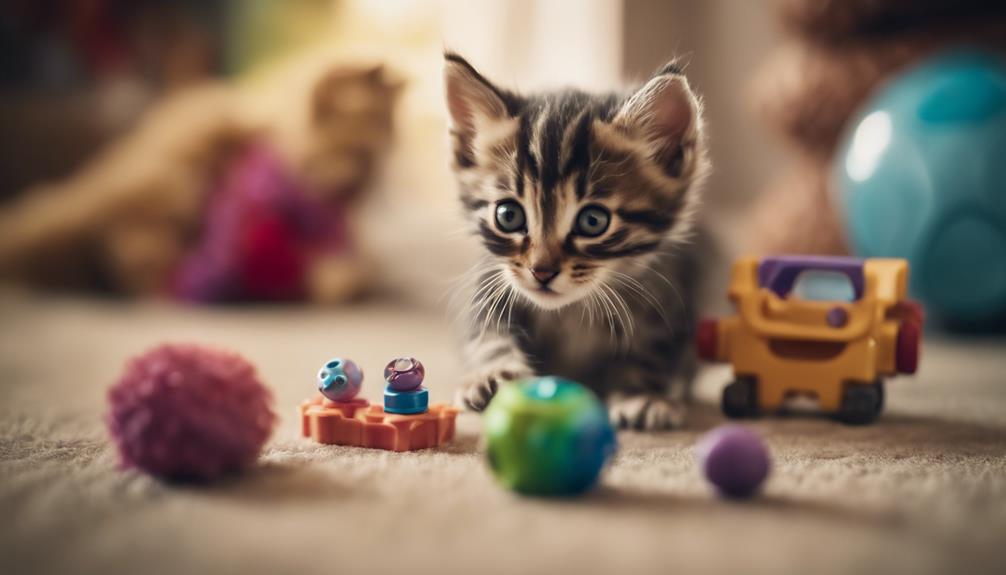
Starting socialization early in a cat's life is crucial as it helps build trust and a strong bond with humans.
Timely socialization also plays a vital role in preventing potential behavior issues that may arise in the future.
Early Socialization Is Key
Early socialization plays a crucial role in shaping a cat's behavior and temperament for a lifetime. When kittens are exposed to positive experiences and interactions during their early development, they're more likely to grow up as well-adjusted and sociable felines. Here are three key benefits of timely socialization:
- Reduced Fearfulness: Kittens that are socialized early are less likely to develop fear or aggression towards people, other animals, or new environments.
- Improved Adaptability: Early interaction helps kittens become more adaptable to changes in their environment, making them more resilient and less prone to stress.
- Enhanced Social Skills: Cats that are well-socialized from a young age tend to be more comfortable around humans and other pets, leading to stronger social bonds and better communication skills.
Builds Trust and Bond
Timely socialization of kittens not only reduces fearfulness and enhances adaptability but also builds trust and fosters strong bonds with humans and other pets. Trust building is crucial during the early stages of a kitten's life to ensure they feel secure and comfortable in their environment.
Bonding techniques such as gentle handling, positive reinforcement, and interactive play are essential for fostering a deep connection between kittens and their human companions. By establishing trust early on, kittens are more likely to develop positive relationships with people and other animals, leading to well-adjusted and socialized adult cats.
Investing time in building trust and strong bonds through proper socialization techniques can significantly impact a kitten's overall well-being and happiness throughout their life.
Prevents Behavior Issues
Proper socialization of kittens significantly reduces the likelihood of developing behavior issues later in life. This crucial process sets the foundation for a well-adjusted and balanced cat. Here are three ways timely socialization prevents behavior issues:
- Behavior Modification: Early socialization exposes kittens to different environments, sounds, and stimuli, helping them adapt and respond positively to new situations.
- Training Techniques: Socialized kittens are more receptive to training, making it easier to teach them appropriate behaviors and manners early on.
- Socialization Benefits: Cats that are well-socialized tend to have fewer anxiety-related problems and are more comfortable around people and other animals, leading to healthier interactions and bonding experiences.
Behavioral Impact on Cats
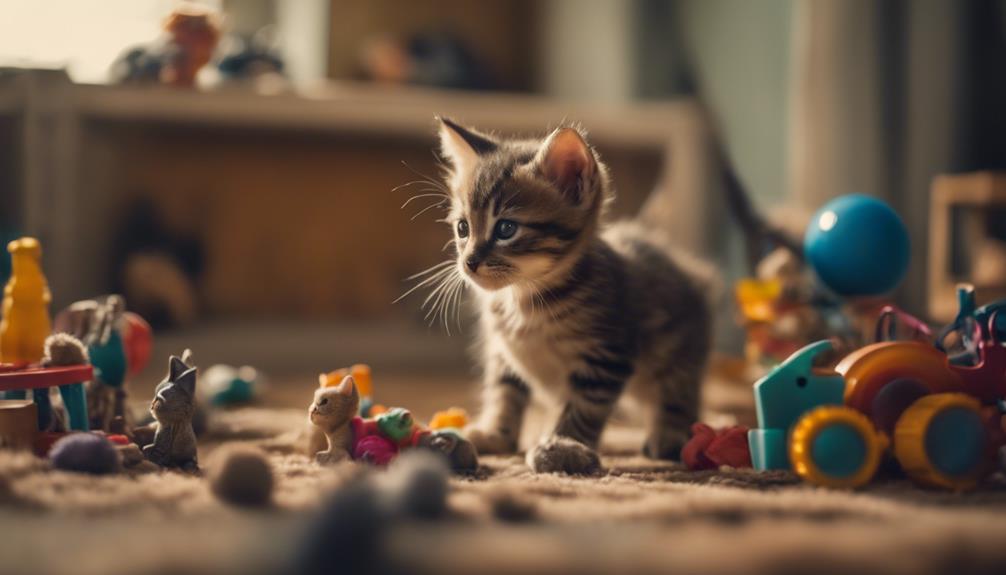
Initiating positive social interactions with cats significantly influences their long-term behavioral patterns and emotional well-being. Feline communication plays a crucial role in how cats interact with humans and other animals. Understanding their body language, vocalizations, and behaviors can help create a harmonious environment for socialization. Environmental enrichment, such as providing scratching posts, interactive toys, and vertical spaces, is essential for stimulating a cat's natural instincts and preventing behavioral issues.
| Feline Communication | Environmental Enrichment |
|---|---|
| Body language signals | Scratching posts |
| Vocalizations | Interactive toys |
| Behavioral cues | Vertical spaces |
Optimal Age for Socialization
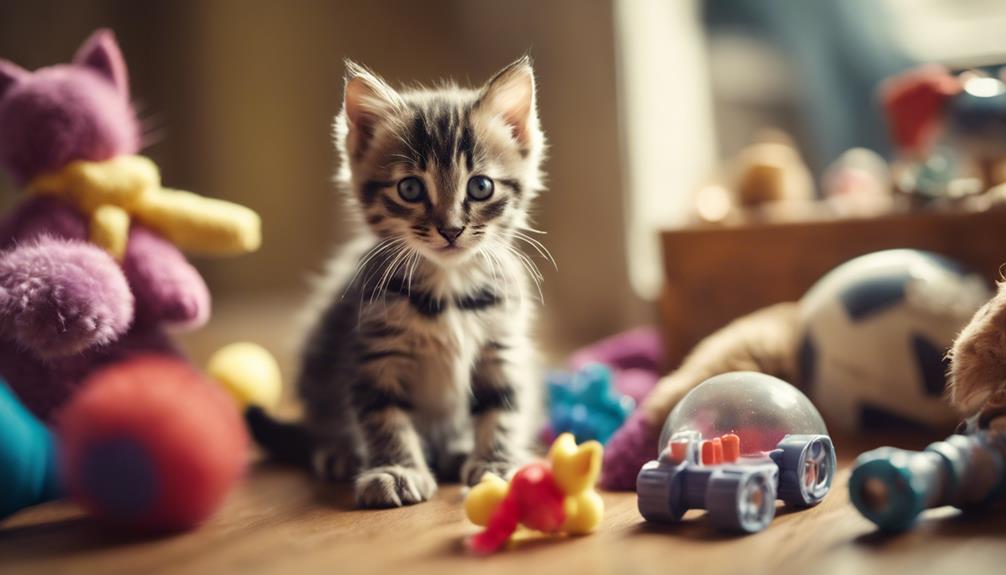
Understanding the most suitable age for socializing cats is crucial for their long-term behavioral development and emotional well-being. To ensure successful cat socialization, it's essential to consider the socialization timeline and developmental stages.
- Critical Period: The optimal age for socializing kittens is between 2 to 7 weeks old. During this critical period, kittens are more receptive to new experiences and interactions, making it easier to shape their social behaviors positively.
- Adolescent Stage: Cats go through a developmental stage around 2 to 7 months old where they may become more cautious and fearful of new stimuli. However, consistent positive social experiences during this period can help mitigate any negative behaviors that may arise.
- Adult Cats: While socializing adult cats is still possible, it may require more time and patience. Understanding an adult cat's socialization history and gradually introducing them to new experiences can help them become more comfortable with social interactions.
Tips for Successful Socialization
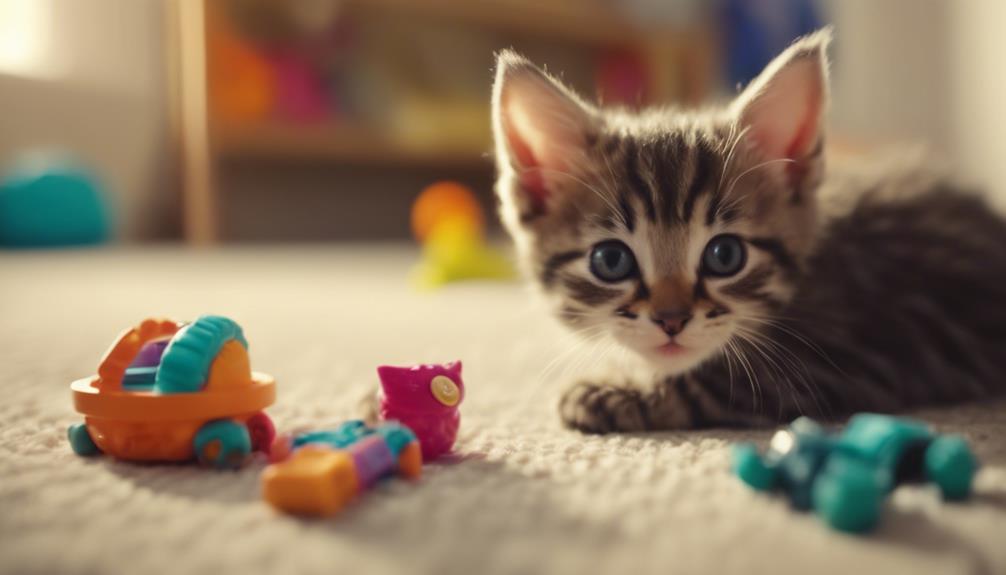
To ensure successful socialization of cats, it is essential to establish a consistent routine of positive interactions and experiences from an early age. Play therapy and positive reinforcement are key components in helping cats develop social skills and build confidence. Incorporating interactive play sessions and rewarding good behavior can greatly aid in the socialization process. Here are some practical tips for successful cat socialization:
| Tips for Successful Socialization | Description | Example |
|---|---|---|
| Start Early | Begin socialization at a young age to help cats adapt more easily to new experiences. | Introduce new people gradually to prevent overwhelming the cat. |
| Use Treats | Utilize treats as positive reinforcement to encourage desirable behaviors during social interactions. | Reward the cat with treats when it approaches new individuals calmly. |
| Respect Boundaries | Allow the cat to set its pace during socialization and respect its need for space. | Avoid forcing interactions and give the cat time to adjust to new environments. |
Common Socialization Mistakes
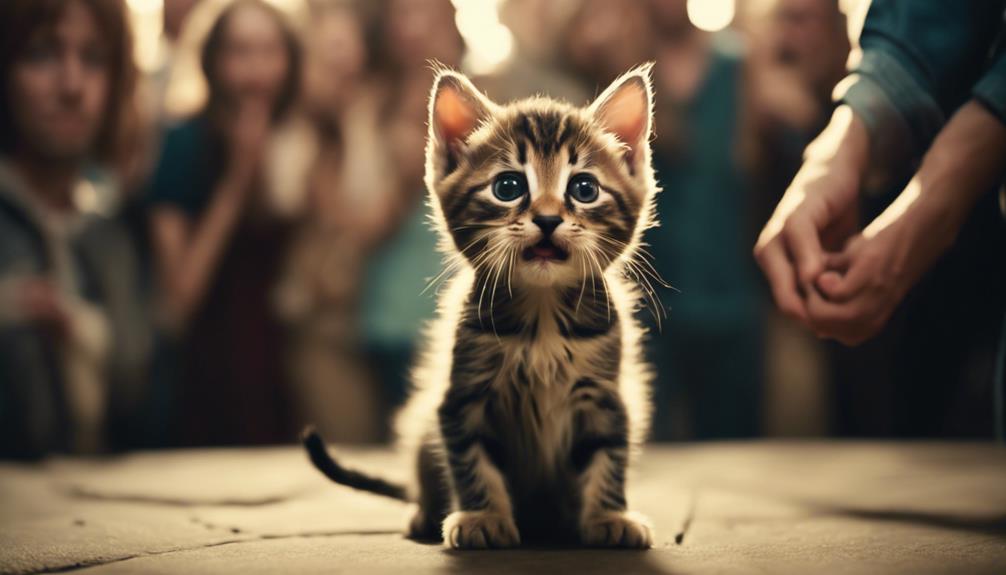
Common mistakes in cat socialization include rushing the process and ignoring the cat's body language signals. Rushing the socialization process can lead to unnecessary stress and anxiety in cats, hindering their ability to adapt to new environments and individuals properly.
Ignoring a cat's body language signals, such as flattened ears or a swishing tail, can result in mishandling mistakes that may escalate into behavioral issues. To ensure successful cat socialization, it's crucial to address these common missteps:
- Proper Training: Lack of proper training on how to handle and interact with cats can lead to misunderstandings and mishaps during socialization.
- Socialization Challenges: Overcoming socialization challenges requires patience, consistency, and a deep understanding of feline behavior cues to create a safe and comfortable environment for the cat.
- Behavioral Issues: Ignoring early signs of behavioral issues during socialization can exacerbate problems in the future, impacting the cat's well-being and relationship with its owners.
Frequently Asked Questions
Can Socialization Be Successful if Started Later in a Cat's Life?
Starting socialization later in a cat's life can still be successful. It may require more patience and time, but it can positively impact behavior in older cats. Consistent, gentle efforts can lead to rewarding results.
How Do You Know if a Cat Has Been Properly Socialized?
Observing a cat's socialization success involves monitoring behavioral cues and body language during interactions. A well-socialized cat displays comfort around people and other animals, engages in play, and shows adaptability in various situations, indicating positive socialization.
Are There Any Long-Term Effects on a Cat's Behavior if They Are Not Properly Socialized?
Failure to properly socialize a cat may lead to long-term behavioral consequences, such as fearfulness, aggression, or anxiety. Early intervention is crucial to address socialization barriers and prevent developmental delays in a cat's behavior.
Can You Socialize a Feral Cat or a Cat With a History of Abuse?
Feral cats can be socialized through patient, gradual methods. Cats with abuse histories may require more time and specialized techniques to build trust and confidence. Consistent positive interactions and a calm environment are key.
Are There Any Specific Techniques or Methods Recommended for Socializing Older Cats?
In the process of rehabilitating senior cats, trust building is key. Using patience and positive reinforcement, older cats can learn to trust again. Techniques such as gradual exposure and gentle interactions can help in their socialization journey.











